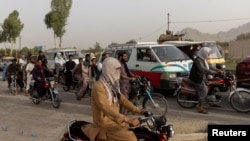The U.N. refugee agency warns Afghanistan is on the brink of another humanitarian crisis as escalating conflict is causing civilian casualties to rise and is driving hundreds of thousands of people to flee their homes in search of safety.
More than 3.5 million people currently are displaced inside Afghanistan. Among them are an estimated 270,000 who have become newly displaced since the beginning of the year due to worsening security in the country.
The U.N. Assistance Mission in Afghanistan reports civilian casualties have risen 29% during the first quarter of this year compared to last. This increase coincides with the U.S. troop withdrawal from the country.
In addition to ongoing fighting, U.N. refugee agency spokesman Babar Baloch says many displaced people report fleeing because of harassment and extortion by armed groups, as well as because of a lack of social services and loss of income due to rising insecurity.
“Our concern is if this does not stop, further numbers may be forced to seek safety inside the country. But there is a potential risk that they may have to seek safety not only in the neighboring countries but beyond as well,” he said.
Baloch noted that Iran and Pakistan host nearly 90% of more than 2 million registered Afghan refugees. He said the generosity and hospitality of these countries should not be taken for granted as they have their own problems of development.
The Taliban have been rapidly retaking land across Afghanistan as the U.S. troop withdrawal accelerates. On Friday, the insurgent group claimed to be in control of 85% of Afghanistan after seizing key border crossings with Iran and Turkmenistan.
Baloch said Afghan women are particularly fearful of losing the many gains they have made over the past 20 years if the Taliban come back to power.
“Women who finally found the space to breathe in Afghanistan—they are anxious, they are worried and probably they are angry as well. They want peace and stability for their country. They do not want to go back to an era where there is no freedom for them,” he said.
Baloch said an examination of casualty figures shows an increasing proportion of women and children becoming victims of targeted killings. He said women activists and women journalists are at particular risk.
The UNHCR is urging the international community to step up support to the government and people of Afghanistan at this critical time.
Afghanistan on Brink of New Humanitarian Crisis, UN Officials Say
- By Lisa Schlein




